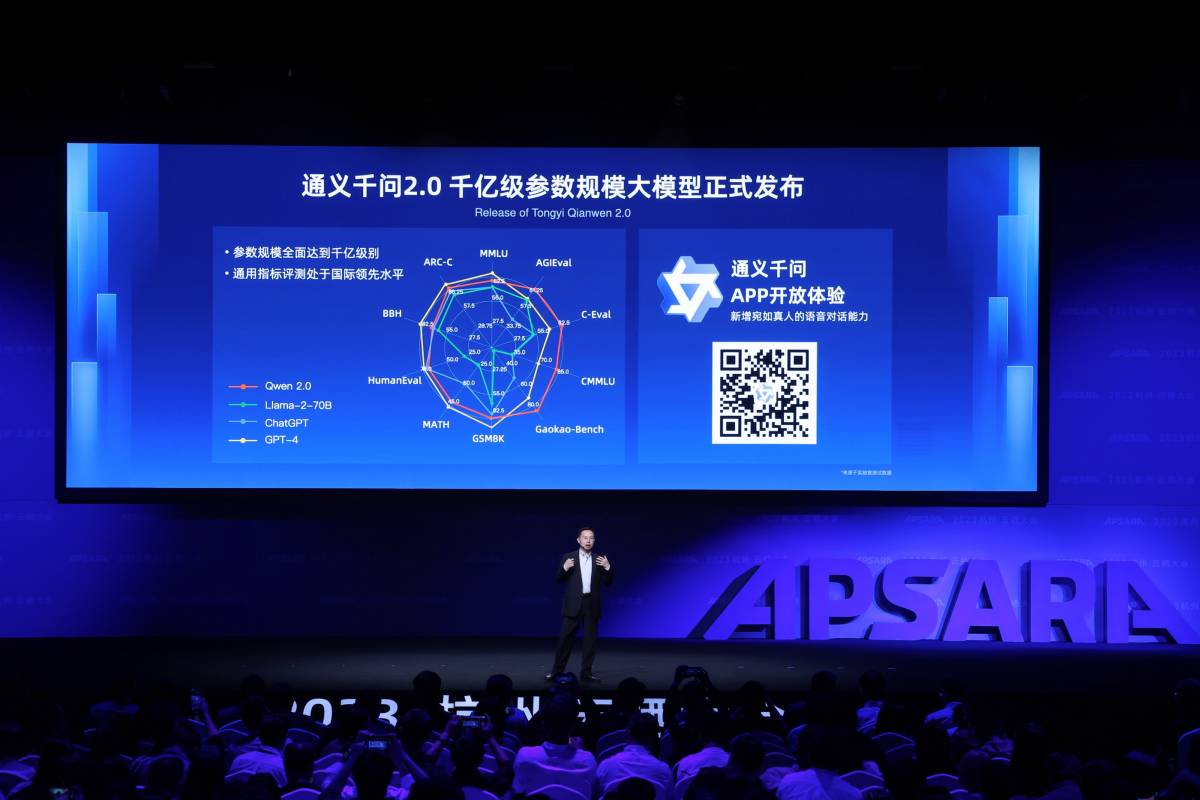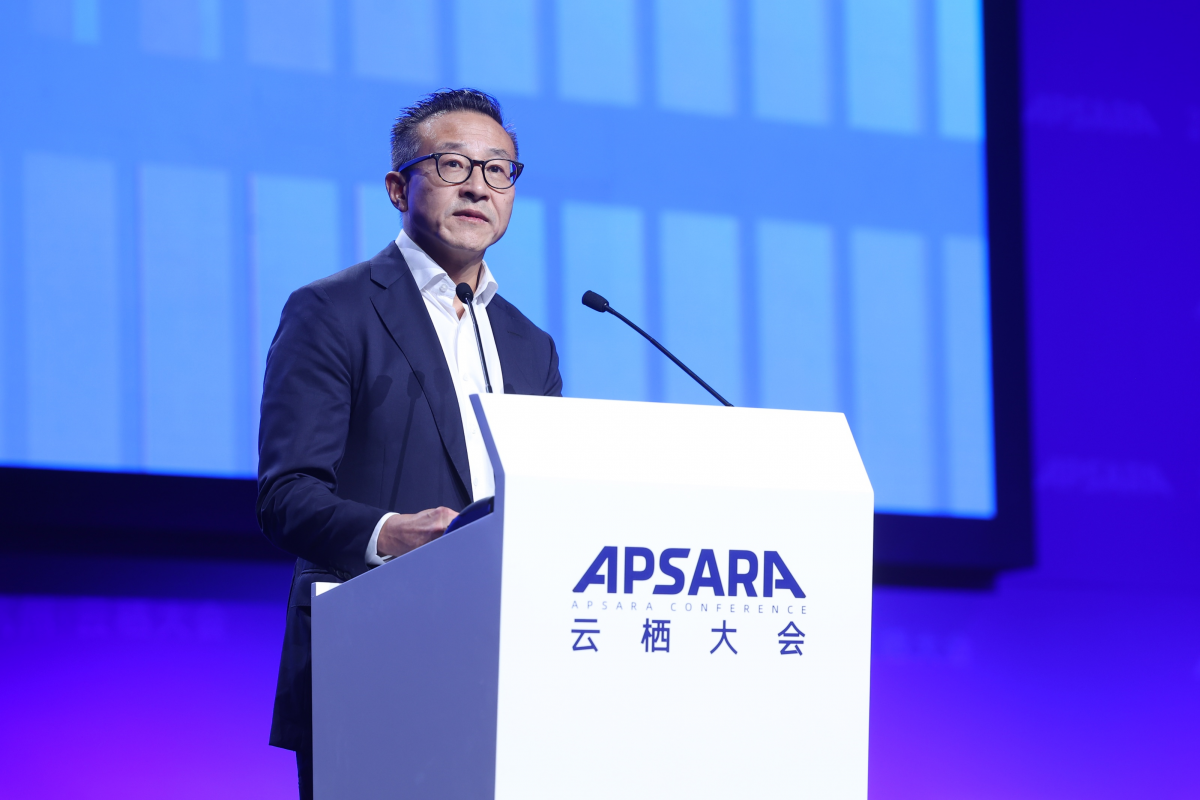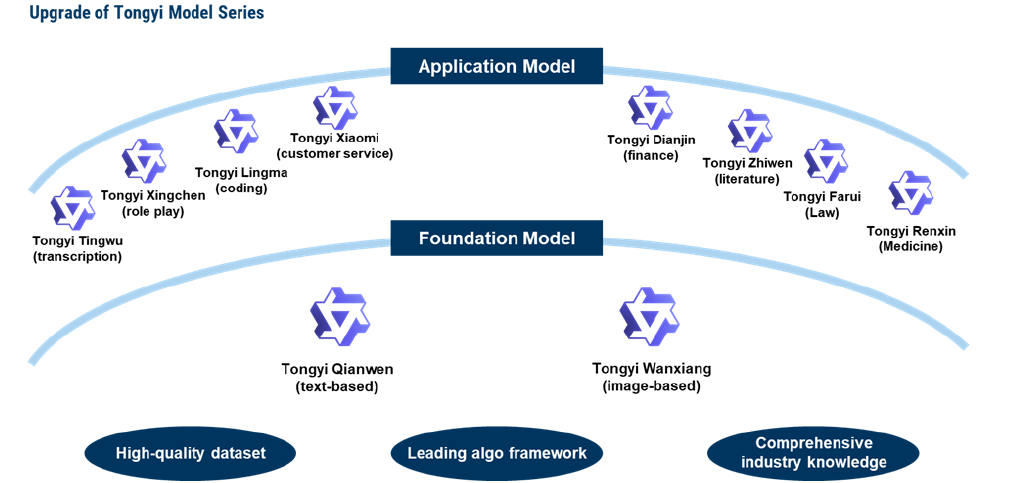
Alibaba Cloud's CTO Jingren Zhou showcases Tongyi Qianwen 2.0 at Apsara Conference. Photo credit: Alibaba Cloud
Alibaba Cloud unveiled the latest version of its large language model Tongyi Qianwen and a series of product updates on Tuesday designed to help its customers reap the benefits of generative AI.
Tongyi Qianwen 2.0 has a bigger model size, with strong capabilities in understanding complex instructions, copywriting, reasoning, memorizing and reducing hallucination, which refers to the tendency of models to create false information.
Alibaba Cloud also released a slew of initiatives covering the entire generative AI tech stack, from infrastructure, model-training platforms, to industry-specific AI models.
“Large language models hold immense potential to revolutionize industries. We’re committed to using cutting-edge technologies, including generative AI, to help our customers capture the growth momentum [going] forward,” said Jingren Zhou, Alibaba Cloud’s CTO.
Generative AI could drive a 7% increase in global GDP and lift productivity growth by 1.5 percentage points over a decade, according to a report by Goldman Sachs, an investment bank.
Alibaba Cloud released the LLM during its flagship event, the Apsara Conference. The annual tech event has attracted over 400 enterprises, institutions and organizations from the cloud computing industry to Hangzhou, where Alibaba Cloud is headquartered. Attendees can pick from over 500 sessions and visit 300 expos showcasing the latest products and technologies.
Currently, 80% of China’s technology companies and half of the country’s large model companies run on Alibaba Cloud, according to the cloud computing company.
“We aim to be the most open cloud in the era of AI. We hope that through this cloud, it will become easier and affordable for everyone to develop and use AI,” said Joe Tsai, Chairman of Alibaba Group during a keynote speech on the first day of Apsara.

Generative AI Models
Alibaba Cloud said Tongyi Qianwen 2.0, a general LLM with a few hundreds of billions of parameters, is a major upgrade from its predecessor, which was launched in April.
The upgraded model has surpassed some other prominent large language models (LLMs) against various industry-recognized benchmarks across domains ranging from language understanding, arithmetic problem solving to question-and-answering.
Alibaba Cloud said it has opened access to the upgraded model to the public via its website and mobile application, and through APIs for developers.
Other than the general AI model, Alibaba Cloud also rolled out a series of domain-specific models to boost productivity across a wide range of industries, ranging from customer support, legal counseling, healthcare, finance, document management, audio & video management, code development, and character creation.
Trained on scads of industry-specific data, the domain-specific models are designed to perform specific tasks with greater precision and can help businesses operate more efficiently. For example, a healthcare AI model unveiled at Apsara can understand medical reports, identify health issues and provide medical advice to address users’ queries.

Gen AI’s Cloud Infrastructure
The cloud computing company showcased a one-stop platform at Apsara that helps developers simplify model development and application building, even for those who don’t have extensive coding expertise.
The GenAI Service Platform provides a suite of tools for corporations to develop AI models and integrate them into software applications. Developers of all levels can use the features to perform tasks required for building domain-specific LLMs, ranging from data management, model deployment and valuation, prompt engineering, to application development.
Generative AI service requires vast computing power and storage capacity to train and run models. To provide the scalability and flexibility needed to deploy generative AI systems. Alibaba Cloud said it has upgraded its Platform for Artificial Intelligence (PAI), a one-stop AI platform, with greater capabilities in computing power, network, storage, data computing and AI frameworks.
It has also enhanced its database solutions with its vector engine to cut the time corporate users need to build customized generative AI applications. The move allows them to input sector-specific knowledge into their vector databases to build domain-specific models and applications.
Futureverse, an AI and metaverse technology company, said last week it has joined forces with Alibaba Cloud to train its text-to-music generation model JEN-1 on PAI.
“Having access to their advanced on-demand training infrastructure and global partner network enables us to move fast and stay ahead in this rapidly evolving market,” said Futureverse co-founder Aaron McDonald in a release.




